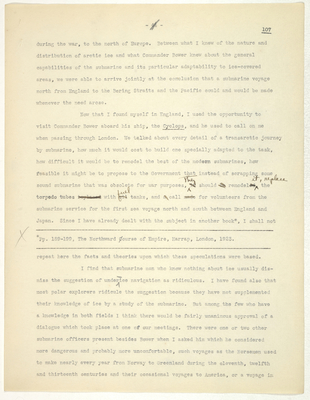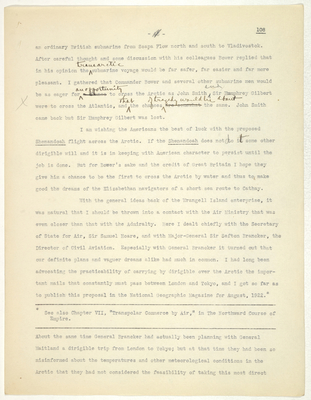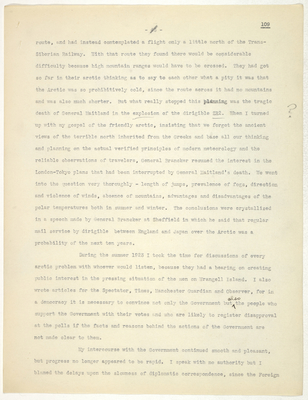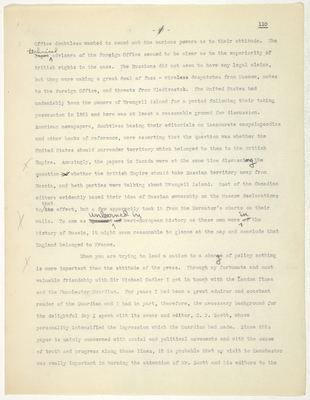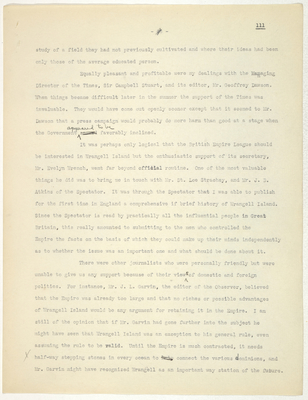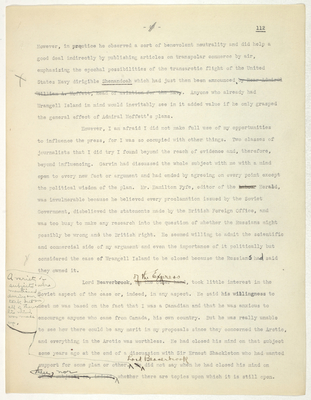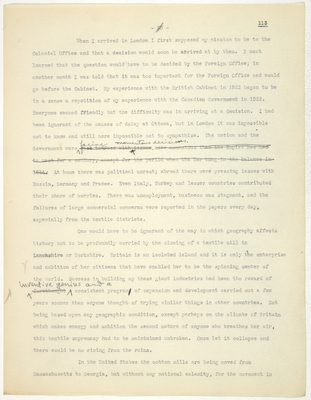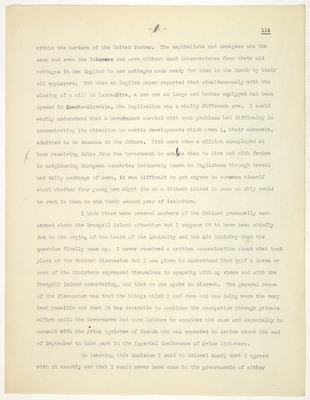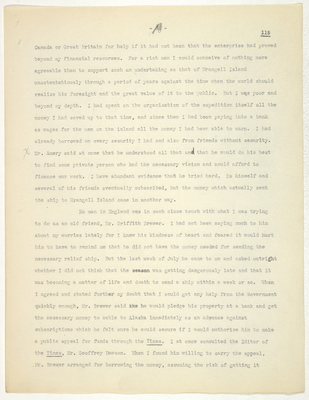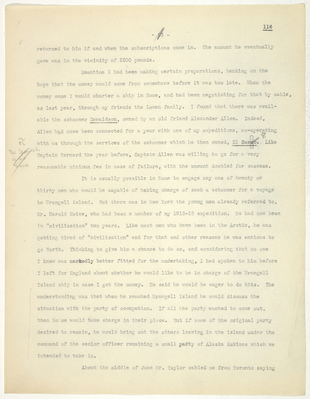Pages That Need Review
stefansson-wrangel-09-28
stefansson-wrangel-09-28-004
- 44 -
107
during the war, to the north of Europe. Between what I knew of the nature and distribution of arctic ice and what Commander Bower knew about the general capabilities of the submarine and its particular adaptability to ice-covered areas, we were able to arrive jointly at the conclusion that a submarine voyage north from England to the Bering Straits and the Pacific could and would be made whenever the need arose.
Now that I found myself in England, I used the opportunity to visit Commander Bower aboard his ship, the Cyclops, and he used to call on me when passing through London. We talked about every detail of a transarctic journey by submarine, how much it would cost to build one specially adapted to the task, how difficult it would be to remodel the best of the modem submarines, how feasible it might be to propose to the Government that, instead of scrapping some sound submarine that was obsolete for war purposes, it they should be remodeled it, replace the torpedo tubes replaced with oil fuel tanks, and a call made for volunteers from the submarine service for the first sea voyage north and south between England and Japan. Since I have already dealt with the subject in another book*, I shall not ------------------------------------------------------------------------------------------------------- X *Pp. 189-199, The Northward Course of Empire, Harrap, London, 1923. ---------------------------------------------------------------------------------------------------- repeat here the facts and theories upon which these speculations were based.
I find that submarine men who know nothing about ice usually dismiss the suggestion of under-ice navigation as ridiculous. I have found also that most polar explorers ridicule the suggestion because they have not supplemented their knowledge of ice by a study of the submarine. But among the few who have a knowledge in both fields I think there would be fairly unanimous approval of a dialogue which took place at one of our meetings. There were one or two other submarine officers present besides Bower when I asked him which he considered more dangerous and probably more uncomfortable, such voyages as the Norsemen used to make nearly every year from Norway to Greenland during the eleventh, twelfth and thirteenth centuries and their occasional voyages to America, or a voyage in
stefansson-wrangel-09-28-005
108
- 45 -
an ordinary British submarine from Scapa Flow north and south to Vladivostok. After careful thought and some discussion with his colleagues Bower replied that in his opinion the transarctic submarine voyage would be far safer, far easier and far more pleasant. I gathered that Commander Bower and several other submarine men would be as eager for an opportunity a chance to cross the Arctic as John Smith and Sir Humphrey Gilbert X were to cross the Atlantic, and that the chances of tragedy would be about are somewhat the same. John Smith came back but Sir Humphrey Gilbert was lost.
I am wishing the Americans the best of luck with the proposed Shenandoah flight across the Arctic. If the Shenandoah does not do it some other dirigible will and it is in keeping with American character to persist until the job is done. But for Bower's sake and the credit of Great Britain I hope they give him a chance to be the first to cross the Arctic by water and thus to make good the dreams of the Elizabethan navigators of a short sea route to Cathay.
With the general ideas back of the Wrangell Island enterprise, it was natural that I should be thrown into a contact with the Air Ministry that was even closer than that with the Admiralty. Here I dealt chiefly with the Secretary of State for Air, Sir Samuel Hoare, and with Major-General Sir Sefton Brancker, the Director of Civil Aviation. Especially with General Brancker it turned out that our definite plans and vaguer dreams alike had much in common. I had long been advocating the practicability of carrying by dirigible over the Arctic the important mails that constantly must pass between London and Tokyo, and I got so far as to publish this proposal in the National Geographic Magazine for August, 1922.* ------------------------------------------------------------------------------------------------------------------------- * See also Chapter VII, "Transpolar Commerce by Air," in The Northward Course of Empire. ------------------------------------------------------------------------------------------------------------------------- About the same time General Brancker had actually been planning with General Maitland a dirigible trip from London to Tokyo; but at that time they had been so misinformed about the temperatures and other meteorological conditions in the Arctic that they had not considered the feasibility of taking this most direct
stefansson-wrangel-09-28-006
109
- 46 -
route, and had instead contemplated a flight only a little north of the TransSiberian Railway. With that route they found there would be considerable difficulty because high mountain ranges would have to be crossed. They had got so far in their arctic thinking as to say to each other what a pity it was that the Arctic was so prohibitively cold, since the route across it had no mountains and was also much shorter. But what really stopped this planning was the tragic death of General Maitland in the explosion of the dirigible ZR2. When I turned [in margain: ?] up with my gospel of the friendly arctic, insisting that we forget the ancient views of the terrible north inherited from the Greeks and base all our thinking and planning on the actual verified principles of modern meteorology and the reliable observations of travelers, General Brancker resumed the interest in the London-Tokyo plans that had been interrupted by General Maitland's death. We went into the question very thoroughly - length of jumps, prevalence of fogs, direction and violence of winds, absence of mountains, advantages and disadvantages of the polar temperatures both in summer and winter. The conclusions were crystallized in a speech made by General Brancker at Sheffield in which he said that regular mail service by dirigible between England and Japan over the Arctic was a probability of the next ten years.
During the summer 1923 I took the time for discussions of every arctic problem with whoever would listen, because they had a bearing on creating public interest in the pressing situation of the men on Wrangell Island. I also wrote articles for the Spectator, Times, Manchester Guardian and Observer, for in a democracy it is necessary to convince not only the Government but also the people who support the Government with their votes and who are likely to register disapproval at the polls if the facts and reasons behind the actions of the Government are not made clear to them.
My intercourse with the Government continued smooth and pleasant, but progress no longer appeared to be rapid. I speak with no authority but I blamed the delays upon the slowness of diplomatic correspondence, since the Foreign
stefansson-wrangel-09-28-007
110
- 47 -
Office doubtless wanted to sound out the various powers as to their attitude. The legal technical advisers of the Forgign Office seemed to be clear as to the superiority of British rights in the case. The Russians did not seem to have any legal claims, but they were making a great deal of fuss - wireless despatches from Moscow, notes to the Foreign Office, and threats from Vladivostok. The United States had undeniably been the owners of Wrangell Island for a period following their taking possession in 1881 and here was at least a reasonable ground for discussion. American newspapers, doubtless basing their editorials on inaccurate encyclopaedias and other books of reference, were asserting that the question was whether the United States should surrender territory which belonged to them to the British X Empire. Amusingly, the papers in Canada were at the same time discussing the question of whether the British Empire should take Russian territory away from Russia, and both parties were talking about Wrangell Island. Most of the Canadian editors evidently based their idea of Russian ownership on the Moscow declarations to that the effect, but a few apparently took it from the Mercator's charts on their X walls. To one as ignorant unlearned in of west-European history as these men were in of the history of Russia, it might seem reasonable to glance at the map and conclude that England belonged to France.
X When you are trying to lead a nation to a change of policy nothing is more important than the attitude of the press. Through my fortunate and most valuable friendship with Sir Michael Sadler I got in touch with the London Times and the Manchester Guardian. For years I had been a great admirer and constant reader of the Guardian and I had in part, therefore, the necessary background for the delightful day I spent with its owner and editor, C. P. Scott, whose personality intensified the impression which the Guardian had made. Since this paper is mainly concerned with social and political movements and with the cause of truth and progress along those lines, it is probable that my visit to Manchester was really important in turning the attention of Mr. Scott and his editors to the
stefansson-wrangel-09-28-008
111
- 48 -
study of a field they had not previously cultivated and where their ideas had been only those of the average educated person.
Equally pleasant and profitable were my dealings with the Managing Director of the Times, Sir Campbell Stuart, and its editor, Mr. Geoffrey Dawson. When things became difficult later in the summer the support of the Times was invaluable. They would have come out openly sooner except that it seemed to Mr. Dawson that a press campaign would probably do more harm than good at a stage when the Government appeared to be seemed favorably inclined.
It was perhaps only logical that the British Empire League should be interested in Wrangell Island but the enthusiastic support of its secretary, Mr. Evelyn Wrench, went far beyond official routine. One of the most valuable things he did was to bring me in touch with Mr. St. Loe Strachey, and Mr. J. B. Atkins of the Spectator. It was through the Spectator that I was able to publish for the first time in England a comprehensive if brief history of Wrangell Island. Since the Spectator is read by practically all the influential people in Great Britain, this really amounted to submitting to the men who controlled the Empire the facts on the basis of which they could make up their minds independently as to whether the issue was an important one and what should be done about it.
There were other journalists who were personally friendly but were unable to give us any support because of their views of domestic and foreign politics. For instance, Mr. J. L. Garvin, the editor of the Observer, believed that the Empire was already too large and that no riches or possible advantages of Wrangell Island would be any argument for retaining it in the Empire. I am still of the opinion that if Mr. Garvin had gone farther into the subject he might have seen that Wrangell Island was an exception to his general rule, even assuming the rule to be valid. Until the Empire is much contracted, it needs X half-way stepping stones in every ocean to help connect the various dominions, and Mr. Garvin might have recognized Wrangell as an important way station of the future.
stefansson-wrangel-09-28-009
112
- 49 -
However, in practice he observed a sort of benevolent neutrality and did help a good deal indirectly by publishing articles on transpolar commerce by air, emphasizing the epochal possibilities of the transarctic flight of the United X States Navy dirigible Shenandoah which had just then been announced. by Rear Admiral William A. Moffett, head of aviation for the Navy. Anyone who already had Wrangell Island in mind would inevitably see in it added value if he only grasped the general effect of Admiral Moffett's plans.
However, I am afraid I did not make full use of my opportunities to influence the press, for I was so occupied with other things. Two classes of journalists that I did try I found beyond the reach of evidence and, therefore, beyond influencing. Garvin had discussed the whole subject with me with a mind open to every new fact or argument and had ended by agreeing on every point except the political wisdom of the plan. Mr. Hamilton Fyfe, editor of the Labour Herald, was invulnerable because he believed every proclamation issued by the Soviet Government, disbelieved the statements made by the British Foreign Office, and was too busy to make any research into the question of whether the Russians might possibly be wrong and the British right. He seemed willing to admit the scientific and commercial side of my argument and even the importance of it politically but X considered the case of Wrangell Island to be closed because the Russians had said they owned it.
Lord Beaverbrook, on the other hand of the Express, took little interest in the Soviet aspect of the case or, indeed, in any aspect. He said his willingness to meet me was based on the fact that I was a Canadian and that he was anxious to encourage anyone who came from Canada, his own country. But he was really unable to see how there could be any merit in my proposals since they concerned the Arctic, and everything in the Arctic was worthless. He had closed his mind on that subject some years ago at the end of a discussion with Sir Ernest Shackleton who had wanted support for some plan or other. A variety of subjects were mentioned during our talk but on all of them his mind was made up. He Lord Beaverbrook did not say when he had closed his mind on other subjects or, indeed, these, nor whether there are topics upon which it is still open.
stefansson-wrangel-09-28-010
113
- 50 -
When I arrived in London I first supposed my mission to be to the Colonial Office and that a decision would soon be arrived at by them. I next learned that the question would have to be decided by the Foreign Office; in another month I was told that it was too important for the Foreign Office and would go before the Cabinet. My experience with the British Cabinet in 1923 began to be in a sense a repetition of my experience with the Canadian Government in 1922. Everyone seemed friendly but the difficulty was in arriving at a decision. I had been ignorant of the causes of delay at Ottawa, but in London it was impossible not to know and still more impossible not to sympathize. The nation and the Government were facing momentous decisions. face to face with issues. more momentous than the Empire has had to meet for a century, except for the period when the War hung in the balance in 1914. At home there was political unrest; abroad there were pressing issues with Russia, Germany and France. Even Italy, Turkey and lesser countries contributed their share of worries. There was unemployment, business was stagnant, and the failures of large commercial concerns were reported in the papers every day, especially from the textile districts.
One would have to be ignorant of the way in which geography affects history not to be profoundly worried by the closing of a textile mill in Lancashire or Yorkshire. Britain is an isolated island and it is only the enterprise X and ambition of her citizens that have enabled her to be the spinning center of the world. Success in building up these giant industries had been the reward of forethought inventive genius and a consistent programs of expansion and development carried out a few years sooner than anyone thought of trying similar things in other countries. Not being based upon any geographic condition, except perhaps on the climate of Britain which makes energy and ambition the second nature of anyone who breathes her air, this textile supremacy had to be maintained unbroken. Once let it collapse and there could be no rising from the ruins.
In the United States the cotton mills are being moved from Massachusetts to Georgia, but without any national calamity, for the movement is
stefansson-wrangel-09-28-011
114
- 51 -
within the borders of the United States. The capitalists and managers are the same and even the laborers can move without much inconvenience from their old cottages in New England to new cottages made ready for them in the South by their old employers. But when an English paper reported that simultaneously with the closing of a mill in Lancashire, a new one as large and better equipped had been opened in Czecho-Slovakia, the implication was a wholly different one. I could easily understand that a Government worried with such problems had difficulty in concentrating its attention on arctic developments which even I, their advocate, admitted to be decades in the future. With more than a million unemployed at X home receiving doles from the Government to enable them to live and with famine in neighboring European countries intimately known to Englishmen through travel and daily exchange of news, it was difficult to get anyone to concern himself about whether four young men might die on a distant island in case no ship could be sent to them to end their second year of isolation.
I know there were several members of the Cabinet personally concerned about the Wrangell Island situation but I suppose it to have been chiefly due to the urging of the heads of the Admiralty and the Air Ministry that the question finally came up. I never received a written communication about what took place at the Cabinet discussion but I was given to understand that half a dozen or more of the Ministers expressed themselves in sympathy with my views and with the Wrangell Island undertaking, and that no one spoke in dissent. The general sense of the discussion was that the things which I had done and was doing were the very best possible and that it was desirable to continue the occupation through private effort until the Government had more leisure to consider the case and especially to consult with the Prime Minister of Canada who was expected to arrive about the end of September to take part in the Imperial Conference of Prime Ministers.
On learning this decision I said to Colonel Amery that I agreed with it exactly and that I would never have come to the governments of either
stefansson-wrangel-09-28-012
115
- 52 -
Canada or Great Britain for help if it had not been that the enterprise had proved beyond my financial resources. For a rich man I could conceive of nothing more agreeable than to support such an undertaking as that of Wrangell Island unostentatiously through a period of years against the time when the world should realize his foresight and the great value of it to the public. But I was poor and beyond my depth. I had spent on the organization of the expedition itself all the money I had saved up to that time, and since then I had been paying into a bank as wages for the men on the island all the money I had been able to earn. I had already borrowed on every security I had and also from friends without security. X Mr. Amery said at once that he understood all that and that he would do his best to find some private person who had the necessary vision and could afford to finance our work. I have abundant evidence that he tried hard. He himself and several of his friends eventually subscribed, but the money which actually sent the ship to Wrangell Island came in another way.
No man in England was in such close touch with what I was trying to do as an old friend, Mr. Griffith Brewer. I had not been saying much to him about my worries lately for I knew his kindness of heart and feared it would hurt him to have to remind me that he did not have the money needed for sending the necessary relief ship. But the last week of July he came to me and asked outright whether I did not think that the season was getting dangerously late and that it was becoming a matter of life and death to send a ship within a week or so. When I agreed and stated further my doubt that I could get any help from the Government quickly enough, Mr. Brewer said the he would pledge his property at a bank and get the necessary money to cable to Alaska immediately as an adyance against subscriptions which he felt sure he could secure if I would authorize him to make a public appeal for funds through the Times. I at once consulted the Editor of the Times, Mr. Geoffrey Dawson. When I found him willing to carry the appeal, Mr. Brewer arranged for borrowing the money, assuming the risk of getting it
stefansson-wrangel-09-28-013
116
- 53 -
returned to him if and when the subscriptions came in. The amount he eventually gave was in the vicinity of 2500 pounds.
Meantime I had been making certain preparations, banking on the hope that the money would come from somewhere before it was too late. When the money came I would charter a ship in Nome, and had been negotiating for that by cable, as last year, through my friends the Lomen family. I found that there was available the schooner Donaldson, owned by an old friend Alexander Allen. Indeed, Allen had once been connected for a year with one of my expeditions, co-operating [in margain: ñ The Spanish is [...]] with us through the services of the schooner which he then owned, El Sueño. Like Captain Bernard the year before, Captain Allen was willing to go for a very reasonable minimum fee in case of failure, with the amount doubled for success.
It is usually possible in Nome to engage any one of twenty or thirty men who would be capable of taking charge of such a schooner for a voyage to Wrangell Island. But there was in New York the young man already referred to, Mr. Harold Noice, who had been a member of my 1913-18 expedition. He had now been in "civilization" two years. Like most men who have been in the Arctic, he was getting tired of "civilization" and for that and other reasons he was anxious to go North. Thinking to give him a chance to do so, and considering that no one I knew was markedly better fitted for the undertaking, I had spoken to him before I left for England about whether he would like to be in charge of the Wrangell Island ship in case I got the money. He said he would be eager to do this. The understanding was that when he reached Wrangell Island he would discuss the situation with the party of occupation. If all the party wanted to come out, then Noice would take charge in their place. But if some of the original party desired to remain, he would bring out the others leaving in the island under the command of the senior officer remaining a small patty of Alaska Eskimos which we intended to take in.
About the middle of June Mr. Taylor cabled me from Toronto saying
